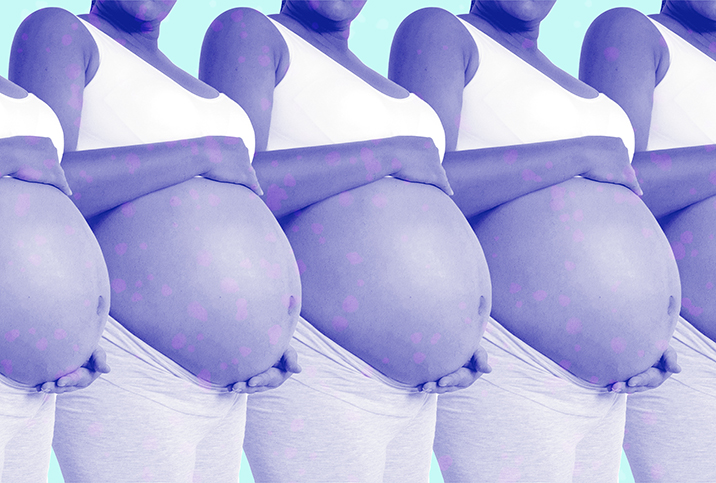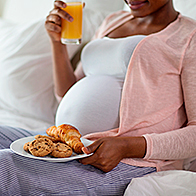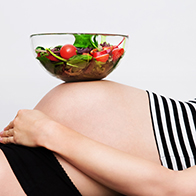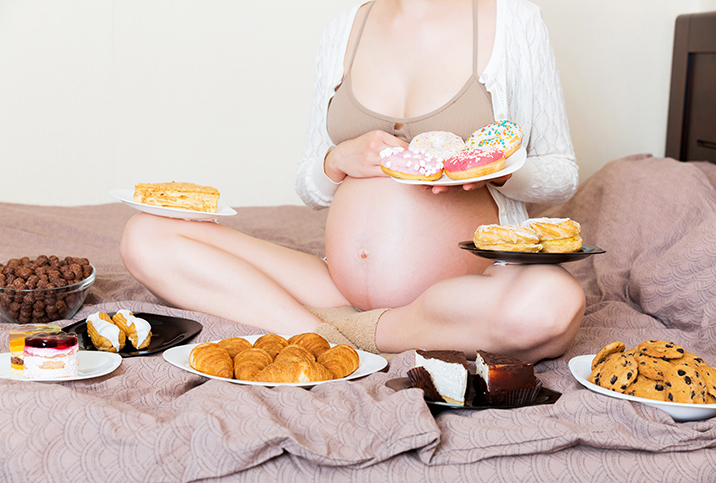Are You Getting Enough Nutrients for a Multiple Pregnancy?

When two or more babies grow in the mother's womb, greater care must be taken for the health of the mother and the fetuses. During these pregnancies, the mother's symptoms are usually heightened and associated with greater risks, including nutritional ones. For this reason, it is essential to ensure an appropriate intake of energy and nutrients during multiple pregnancy.
"Meeting nutritional goals during pregnancy is crucial to maintain the health of the mother and that of the babies throughout the duration of the multiple pregnancies," said Emmanuel Aguh, M.D., a family medicine doctor in Virginia who is known as the Whiz Doc on Instagram.
Singleton pregnancies—one baby—are demanding enough.
"Twin or multifetal pregnancies are even more so…you have two babies 'stealing' your energy and nutrients in order to grow," said Jacquelyn Means, M.D., an OB-GYN who specializes in low- and high-risk obstetrics in Plano, Texas.
Higher caloric intake
Women carrying multiples should consume an extra 300 calories per day for each additional baby, according to the American College of Obstetricians and Gynecologists: "If you are pregnant with twins, you need an extra 600 calories a day. For triplets and more, talk with your obstetrician-gynecologist (OB-GYN) about the right amount of weight gain for your pregnancy."
A twin pregnancy is considered as having two pregnancies simultaneously.
"With a multiple pregnancy, it is important to take in more calories and protein," Aguh said. "Good nutrition has a greater impact in a multiple pregnancy than a singleton pregnancy, although it applies to both."
Means pointed to the third trimester—"when babies are in their rapid growth phase"—as particularly important for pregnant women nutritionally. That's when the metabolic rate of a mom carrying twins is "about 10 percent higher than her singleton counterpart," she said.
"Multiple pregnancies constitute a special challenge in terms of nutrition. The presence of more than one fetus contributes to a higher metabolic demand, thus increasing the risk of nutritional deficiencies," indicated a study on micronutrients in multiple pregnancies published in 2021 by the journal Nutrients.
For Aracelis Molino's body, a multiple pregnancy was a challenge. The Madrid resident is 5 feet tall and weighed 105 pounds before pregnancy. She hovered around 90 pounds 15 days after she gave birth. According to her doctors, her liver was not processing some vitamins properly.
She tried to compensate with food and supplements, but "the girls took what they needed and I didn't have enough," Molino said.
It took her two years to get back to her typical weight with the help of nutritionists. Her case is not among the most frequent, but some mothers have certain nutritional deficiencies during a multiple pregnancy. That's why having the proper nutrients during multiple pregnancy is essential to staying healthy.
Supplements during a multiple pregnancy
Many pregnant patients can stay healthy only with good nutrition and supplements. Prenatal vitamins are essential for a multiple pregnancy.
"There is also an increased need for certain nutrients during a multiple pregnancy that might require additional supplementation, which the healthcare provider will recommend," Aguh said.
Twin or multifetal pregnancies have an increased risk of nutritional deficiency, including iron deficiency anemia, which is the most common type of anemia in pregnancy.
"Iron deficiency anemia is almost a certainty in twin or multifetal pregnancies," Means said.
Prenatal vitamins generally contain iron, however, the amount is often not enough to meet the demands of a twin pregnancy. Means called out gummy vitamins as often including little or no iron.
Without adequate supplementation of folate (folic acid), vitamin D, calcium, DHA and B12, the risk of deficiency is increased during multifetal pregnancies. DHA, or docosahexaenoic acid, is an omega-3 fatty acid.
"Folate and DHA catch my eye most on this list, as their importance in normal pregnancies is well-established," Means said.
Folic acid is critical for the development of the spine and brain, and DHA is important for a baby's brain and eye development. DHA has also been implicated in preterm birth, Means said, "which is already a higher risk for twin pregnancies."
The type of food
While eating candy on occasion can't hurt, especially with cravings, it is important to maintain a healthy, balanced and nutritious diet. The focus should be on protein and calorie-rich foods, Aguh noted.
Some recommended foods during this time include low-fat yogurt, eggs, lean proteins (chicken, pork, turkey and beef), beans, fish rich in omega-3, iron-fortified cereals, low-fat milk, nuts, seeds, fruits and vegetables.
Many expectant patients experience morning sickness, such as nausea, vomiting and loss of appetite. According to Aguh, this sickness may make it difficult to eat the foods that are needed. The good news is the symptoms tend to improve later in pregnancy.
All patients are different
Women with multifetal pregnancies often need to increase their caloric intake. However, an individualized medical consultation is required to consider body mass index (BMI) and prepregnancy diet.
"It is not uncommon that it turns out to be necessary to maintain the diet's energy value or even reduce it. An excessive body weight gain during pregnancy, as it is frequently observed, even more so justifies the need of an individual approach to energy requirements," noted a 2022 review in the journal Nutrients.
"Know that the quality of what is eaten is just as important as the quantity," Aguh said.
In other words, being pregnant does not give someone a license to eat all kinds of junk food. Nor should anyone think of eating large quantities, because eating for three or four is not the solution. Each stage of pregnancy has its requirements. The idea is to maintain a healthy diet with foods that provide all the nutritional requirements.
Close monitoring
Twin and multifetal pregnancies are considered high-risk pregnancies and are monitored more closely by specialists "due to the increased rates of pregnancy complications, such as preterm birth, gestational diabetes, gestational hypertension or preeclampsia, just to name a few," Means said.
That is why it is crucial to establish an adequate diet to help avoid further complications. The diet should allow the mother to achieve an adequate weight and the recommended nutritional values. In addition to the nutritional follow-up of the mother, the growth of the babies is monitored throughout the pregnancy, too.
"Increased monitoring includes frequent ultrasounds to assess fetal growth, amniotic fluid levels and the placenta," Means explained. "Multifetal pregnancies are often monitored by both the primary OB-GYN and a high-risk OB specialist [in] maternal fetal medicine."
With the proper nutrients during multiple pregnancy, a mother can have a safe and healthy experience.
Editor's note: These statements have not been evaluated by the Food and Drug Administration. Our medical experts advise that you consult with your primary healthcare provider before you begin using a supplement. This information is not intended to diagnose, treat, cure or prevent disease.




















